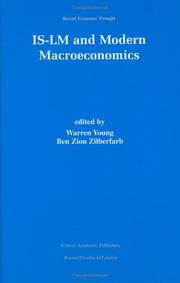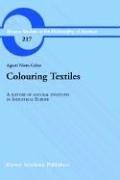| Listing 1 - 4 of 4 |
Sort by
|

ISBN: 0792373944 9401038694 9401006482 Year: 2001 Publisher: Boston, Mass. Kluwer Academic
Abstract | Keywords | Export | Availability | Bookmark
 Loading...
Loading...Choose an application
- Reference Manager
- EndNote
- RefWorks (Direct export to RefWorks)
Evolutionary Economics: Program and Scope offers a fresh look at the paradigmatic foundations and basic theoretical propositions of economics. Twelve authors - each of them with his own distinct contribution to economics - make a step forward by reinterpreting major areas of micro and macroeconomics in line with modern evolutionary thinking. This volume offers a unified approach to economics that allows recent developments in various strands of Evolutionary Economics to be integrated and major positions of Neoclassical Economics to be reconsidered. The chapters on `Evolutionary Macro Economics' explore macro areas such as the division of labor and knowledge, technology and institutions, population thinking, meso economics, techno-economic trajectories and industrial sectors. By telescoping structure into time, they highlight the processes of structural change and co-evolution between technologies and institutions, and provide a causal-explanatory core for a modern - evolutionary - theory of economic growth and economic development. The chapters on `Evolutionary Micro Economics' offer insights into the knowledge based theories of the firm and take up the issues of cognitive and behavioral routines. The contributions explore the processes of complex human choice, creativity, and adaptation in selective and path-dependent environments. The discussions make an essential contribution to the cognitive and behavioral foundations of a modern institutional economics.
Economic schools --- Economic history. --- History of Economic Thought/Methodology. --- Economic conditions --- History, Economic --- Economics

ISBN: 0792379667 940100644X 9780792379669 Year: 2001 Publisher: Dordrecht Kluwer Academic Publishers
Abstract | Keywords | Export | Availability | Bookmark
 Loading...
Loading...Choose an application
- Reference Manager
- EndNote
- RefWorks (Direct export to RefWorks)
IS-LM is perhaps the prime example of `cognitive dissonance' in economics, and is problematic to many economists. On the one hand, the IS-LM model is still taught by many academic economists or they use it to derive the AD-AS approach. On the other hand, the same economists realize the limitations of the basic IS-LM model and would not now use it for policy analysis, as they did in the past. The distinction between pedagogical and analytical efficacy is made by all the authors in this volume regarding the IS-LM model. Indeed, even those who would reject using the model for modern policy analysis still see the basic model as useful for teaching purposes. Moreover, in an augmented form, some of the authors in this volume would even see fit to use IS-LM for modern policy analysis. As will be seen, therefore, the IS-LM model is `not yet dead'. Rather, the model's `plasticity' has enabled it to undergo a metamorphosis into augmented form, enabling its continuing utilization in economics accordingly.
AA / International- internationaal --- 330.00 --- 330.01 --- Economische en sociale theorieën: algemeenheden. --- Theorie van het economisch evenwicht. --- IS-LM model (Macroeconomics) --- Macroeconomics --- Economics --- Economische en sociale theorieën: algemeenheden --- Theorie van het economisch evenwicht --- Macroeconomics. --- Economic history. --- Macroeconomics/Monetary Economics//Financial Economics. --- History of Economic Thought/Methodology. --- Economic conditions --- History, Economic

ISBN: 0792376250 9780792376255 1461352975 146150905X Year: 2001 Publisher: Boston : Kluwer Academic Publishers,
Abstract | Keywords | Export | Availability | Bookmark
 Loading...
Loading...Choose an application
- Reference Manager
- EndNote
- RefWorks (Direct export to RefWorks)
Exchange is a pervasive concept in everyday life, affecting phenomena as diverse as interpersonal relationships and market transactions. In addition, economists have used the concept in a highly specific and clearly delineated way. Against this background, Expanding the Economic Concept of Exchange sets out to expand the concept of exchange by crossing the boundaries laid down by economists and by examining the function played by deceptions, self-deceptions and illusions. The main motivation for expanding the concept of exchange was the realization that in the prototypical economic model deception is not taken into account. Hence, economists traditionally regard deception as some sort of irrationality, as a flaw in an otherwise perfectly rational process. Authors represented in this volume take a different approach examining deception as a constituent quality of exchange. This is shown by the contributions drawing on recent developments in economic theory, by those with an anthropological orientation, as well as by a contribution referring specifically to Adam Smith. An interrogation into deception is long overdue in economics. This volume prepares the ground for and makes the first contributions to explicitly acknowledging deceptions, self-deceptions and illusions as fundamental dimensions allowing us as economists to further research and develop the concept of change. A particular and perhaps unexpected focus of this volume lies on anthropology, because economics can clearly benefit from integrating selected results on deception from outside its expanding domain. It is primarily targeted at economists interested in institutional aspects of exchanges and social theory. In addition, the topic will find interested readers from anthropology, cultural studies, science studies, philosophy.
Philosophical anthropology --- Sociology of culture --- Economic sociology --- Economic schools --- Social psychology --- Economics --- Exchange --- Deception --- Self-deception --- Economie politique --- Théorie de l'échange (Economie politique) --- Tromperie --- Déception de soi --- Psychological aspects --- Congresses --- Congresses. --- Aspect psychologique --- Congrès --- Théorie de l'échange (Economie politique) --- Déception de soi --- Congrès --- Economic history. --- Social sciences. --- Philosophy. --- History of Economic Thought/Methodology. --- Social Sciences, general. --- Philosophy, general. --- Mental philosophy --- Humanities --- Behavioral sciences --- Human sciences --- Sciences, Social --- Social science --- Social studies --- Civilization --- Economic conditions --- History, Economic

ISBN: 0792370228 9048157218 9401710813 Year: 2001 Volume: 217 Publisher: Dordrecht Boston Kluwer Academic Publishers
Abstract | Keywords | Export | Availability | Bookmark
 Loading...
Loading...Choose an application
- Reference Manager
- EndNote
- RefWorks (Direct export to RefWorks)
Colouring Textiles is an attempt to provide a new cross-cultural comparative approach to the art of dyeing and printing with natural dyestuffs in the eighteenth and nineteenth centuries. Divided into thematic chapters, it uncovers new data from the vast historical heritage of natural dyestuffs from a range of European cities, to present new historiographic insights for the understanding of this technology. Through a sort of anatomic dissection, the book explores the study and cultivation of dye-plants in botanical gardens and plantations, and the tacit values hidden in dyeing workshops, factories, laboratories, or national and international exhibitions. It metaphorically submits the natural dyestuffs of the eighteenth and nineteenth centuries to a series of systematic historical tests, and traces back the circulation of those sources of colours through colonial spaces, dye works, cross-cultural networks, schools of artistic design, and science-based industries for the making of synthetic colorants. Colouring Textiles contributes to a better understanding of the role of natural dyestuffs in the processes of industrialization in Western Europe. Audience: Historians of science and technology, historians of chemistry, philosophers, economic historians, professional chemists, arts and crafts historians, and cultural anthropologists.
Dyes and dyeing --- -Dyes and dyeing --- -Dyeing --- Dyestuffs --- Tinctorial substances --- Color --- Pigments --- Bleaching --- Cleaning and dyeing industry --- Color in the textile industries --- Coloring matter --- History --- -History --- Europe --- 18th century --- 19th century --- Dyeing --- History. --- Chemistry. --- Philosophy. --- Economic history. --- Organic chemistry. --- History, general. --- Chemistry/Food Science, general. --- Philosophy of Technology. --- History of Economic Thought/Methodology. --- Organic Chemistry. --- Organic chemistry --- Chemistry --- Economic conditions --- History, Economic --- Economics --- Mental philosophy --- Humanities --- Physical sciences --- Annals --- Auxiliary sciences of history
| Listing 1 - 4 of 4 |
Sort by
|

 Search
Search Feedback
Feedback About
About Help
Help News
News